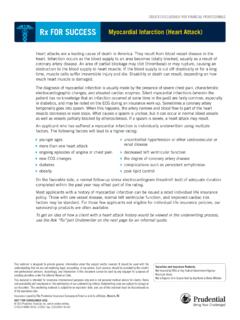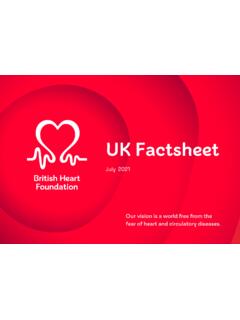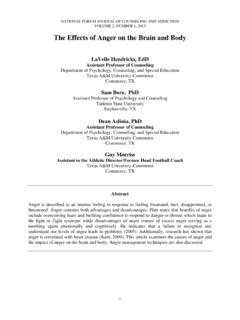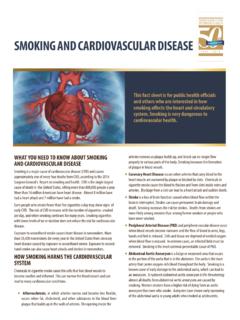Transcription of Manage your heart and stroke risk - cvdcheck.org.au
1 Manage your heart and stroke riskA 3-step guide to better healthAn initiative of the National Vascular Disease Prevention Alliance2 Why do I need to Manage my risk?Every hour, five Australians die from heart , stroke and blood vessel disease*, a group of conditions together known as cardiovascular disease. Many others live with a disability after having a heart attack or stroke . It can be hard to know if you are at risk because often you can t feel any symptoms. The good news is that you can take three steps to improve your health and help reduce your risk of cardiovascular a healthy lifestyle is important at any age, your heart and stroke risk naturally increases with age.
2 If you are over 45 years of age, or over 35 if you are Aboriginal or a Torres Strait Islander, follow the three steps in this plan to decrease your your doctor to find out your personal heart and stroke risk the past your doctor may have treated each of your risk factors one at a time without taking the others into account. your risk score puts all the risk factors together. This is a bit like putting all the pieces of a puzzle together so you can see the whole picture. By looking at the whole picture your doctor can discuss ways that you can reduce your risk of heart attack or people who have particular medical conditions do not need a risk score because they are already at high risk.
3 your doctor will tell you if you are in this group and advise you what to do to reduce your heart attacks and strokes are preventable. Cardiovascular disease is Australia s biggest killer. By following three steps you can improve your health and reduce your risk of heart attack or See your doctor to find out your personal heart and stroke risk Follow your doctor s advice and make changes to your Have a health action plan and follow it.*Australian Bureau of Statistics. Causes of death 2006 ( ). March 20083 How is my heart and stroke risk score measured?
4 your doctor will record a range of your risk factors including: Blood pressure Age Cholesterol Sex Whether you smoke your doctor will also look at other important factors that can increase your risk such as: Diabetes Chronic kidney disease An irregular heart beat also known as atrial fibrillation A family history of heart attack or stroke in a first degree relative (mother, father or sibling) under 55 years of age A family history of high cholesterol If you are overweightYour doctor will calculate your personal heart and stroke risk score by looking at your risk factors and turning them into a percentage score.
5 What is a risk factor?A risk factor is something about your body or behaviour that increases your chance of disease. The more cardiovascular risk factors you have, the more likely you are to have a heart attack or stroke . You can control your risk factors. You can control many of your risk factors, such as your blood pressure, cholesterol, smoking, the amount of alcohol you drink, your food choices, your weight and your level of exercise. your doctor can advise you on a personal health action plan to control your risk factors and reduce your heart and stroke risk.
6 Can I have a risk score if I am already taking medication?Yes, your doctor can give you a risk score even if you are already taking medication for high blood pressure or high cholesterol. your doctor will use your most recent blood pressure or cholesterol test results taken before you started on medication. This will give an estimate of your risk. Where these results are not available, talk to your doctor about the best way to Manage your you know? A score over 15% means you are at high RISK If you have a score of over 15% you have at least a 1 in 7 chance of having a heart attack or stroke in the next five years if left unmanaged.
7 MODERATE RISK If you have a score of between 10-15% you have at least a 1 in 10 chance of having a heart attack or stroke in the next five years if left RISK If you have a score of under 10% you have a less than 1 in 10 chance of having a heart attack or stroke in the next five years if left RISK over 15%MODERATERISK10-15%LOW RISK under 10%No matter what your risk level you can make improvements to your health. Talk to your doctor about the changes you can make to improve your health and reduce your risk of heart attack or stroke . This includes making lifestyle changes and in some cases taking medication.
8 Which lifestyle changes will reduce my risk? Stop smoking and avoid second hand smoke. Be active every day. Aim for at least 30 minutes of moderate intensity exercise such as brisk walking on most, or preferably every day of the week. Step your doctor s advice and make changes to your lifestyle. Avoid adding salt to food. Choose no added salt , low salt or salt reduced foods where possible. Eat a diet rich in vegetables, fruits, wholegrains, lean meats, oily fish, eggs and low fat dairy products. Remember to also eat nuts, seeds and legumes.
9 Limit fried and baked foods especially chips, biscuits, cakes and other baked cereal products. Limit alcohol to less than two standard drinks per day. Limit foods and drinks containing added sugar, especially sugar-sweetened drinks. Maintain a healthy weight. Drink water. 5 What if my doctor prescribes medication?There are many safe and effective drugs available to help you reduce your risk of a heart attack or stroke . Depending on your personal risk score, your doctor may prescribe medication to lower your blood pressure or cholesterol or both at the same time.
10 This will happen as well as helping you to make some changes to your lifestyle. Sometimes it is necessary to adjust the medication or add a second or third medication to make sure your risk reduces. It is important that you visit your doctor regularly to check how you are responding to the medication. Remember Do not stop your medications. Talk to your doctor or ask your pharmacist if you are having any problems. Take all your medications exactly as prescribed by your doctor. Visit your doctor regularly to check how the medication is working.








